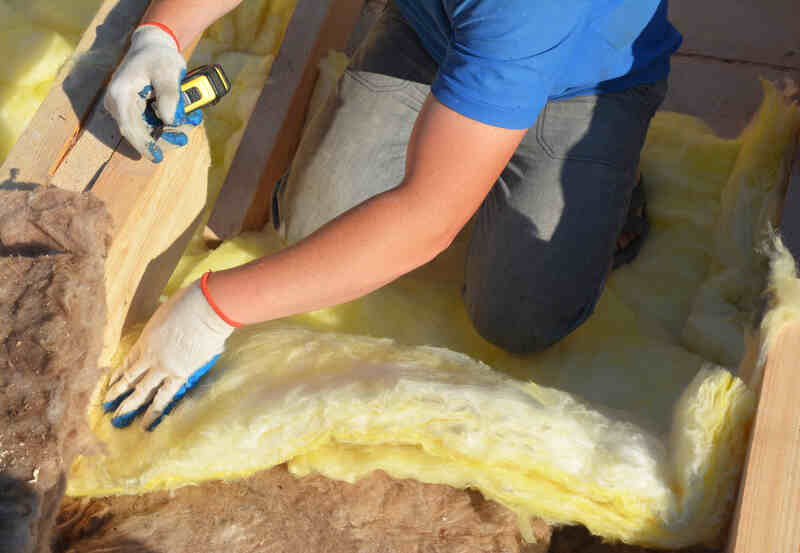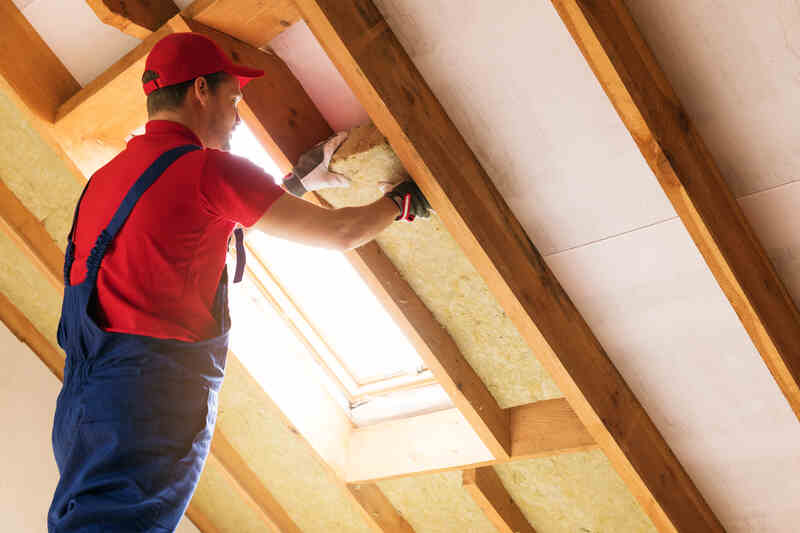How To Start a Roofing Company: A Complete Guide
Your house works hard to keep you warm and your energy bills low. But it doesn’t do it by itself. Behind the scenes, there’s a silent hero at work: insulation, the unsung champion of cozy living and reasonable energy bills.
Insulation is like a warm blanket wrapped around your home. It stops heat from escaping in winter and keeps cool air inside during summer. And this simple idea has grown into a thriving industry. Insulation businesses help homeowners and building owners save money and stay comfortable year-round.
Learn everything you need to know about how to start an insulation business. Discover what makes the insulation industry a good choice for entrepreneurs, plus potential earnings and a step-by-step plan for launching your own company.
RELATED ARTICLE — How To Become an Independent Contractor: A Complete Guide
Why Start an Insulation Company?
Starting an insulation company can be a smart move in the growing market. In 2021, the insulation industry was worth just shy of $50 billion—and it’s not slowing down. Experts expect it to grow by about 7% each year until 2030, potentially reaching $95 billion.
This means there’s plenty of room for new businesses to enter the scene. As more buildings go up and older ones need upgrades, the market demand for insulation keeps rising. Climbing energy costs and growing environmental concerns also make for high demand.
RELATED ARTICLE — How To Start a Home Renovation Business
How Much Do Insulation Business Owners Make?

When it comes to money, there’s a big difference between being an employee and an owner. Insulation workers typically make between $30,000 and $60,000 a year. But as a business owner, you could earn a lot more.
Your income as an owner depends on how well your company does and how much you’re willing (and able) to grow it. Some established spray foam insulation companies earn hundreds of thousands of dollars a year. And the more you make, the more you can pay yourself.
RELATED ARTICLE — How To Price Subcontract Work
What Skills Should Insulation Contractors Have?
To succeed as an insulation contractor, you’ll need a mix of technical know-how and people skills. Here are four key skills you should have:
Insulation Skills
This is the heart of the job. You need to know how to properly apply the types of insulation you plan to work with. This includes both understanding the insulation materials and knowing how to use the equipment.
For example, if you’re interested in learning how to start a spray foam insulation business, consider getting comprehensive training from a relevant spray foam equipment provider.
Customer Service Skills
Happy customers lead to more business. You should be able to explain the insulation process clearly and listen to and address all customer concerns. Aim to be polite and professional at all times.
Safety Consciousness
Working with chemicals and equipment can be dangerous. You’ll need to know how to follow all safety guidelines and use protective gear correctly. You must also keep work areas clean and free of hazards—for the safety of yourself, your staff, and your clients.
Consider specialized training in dealing with potentially hazardous chemicals, particularly if you plan to be a spray foam insulation contractor. The more you know, the more you can prevent accidents.
Problem-Solving Skills
Every job is different, so you need to be able to think on your feet. This means dealing with unexpected issues that pop up during a job, like finding creative ways to insulate tricky spaces. It also means being able to come up with solutions that work for both you and your customers (and communicate them effectively).
RELATED ARTICLE — How To Make an Estimate for Construction (in 7 Steps)
Certifications You Need To Start an Insulation Installation Business
While there are no specific certifications required by law for insulation businesses, getting certified can make you look more professional and knowledgeable.
Some certifications that can help you stand out include:
- Equipment Training. Many spray foam insulation equipment companies offer certifications in using their products. It’s worth it to invest in this training both for safety and professionalism.
- Occupational Safety and Health Administration (OSHA). This certification shows that you understand workplace safety rules and how to prevent accidents on the job.
- EPA Lead-Safe Certification. This is important if you work in older buildings that might have lead paint. It shows you know how to work safely around lead to protect yourself and your customers.
Keep in mind that rules can vary depending on where you live. It’s always a good idea to check with your state and local governments to make sure you have all the certifications you need.
RELATED ARTICLE — How To Estimate a Masonry Job (in 7 Easy Steps)
What Licenses and Permits Are Required for Insulation Companies?

In most areas, there’s no specific license or permit required for insulation installation workers. But there may be more general ones you’ll need to get before you can start working. Just like with certifications, the exact licenses and permits you need can vary depending on where you live, so always do your due diligence.
To start with, most states require you to have a business license. Many states also ask for a contractor’s license, which shows you’re qualified to do construction work.
Because insulation involves using chemicals, some areas might ask you to get some form of environmental permit. This shows you know how to use and dispose of materials safely.
RELATED ARTICLE — Roofing Estimates: How Much Does a Roof Replacement Cost?
How To Start an Insulation Business in 8 Steps
Starting your own insulation business is exciting, but it takes careful planning. Here’s a step-by-step guide to help you get started:
1. Analyze Demand
Before you jump in, make sure enough people in your area need insulation services for your venture to be worthwhile. Check out new construction projects and older homes that might need upgrades. And don’t forget to analyze your competitors. How much do they charge? Is it a crowded market?
2. Create a Business Plan
A business plan is your roadmap. Write down your goals, how you’ll make money, and who your customers will be. Skip to the next section to read more about how to write a business plan.
3. Register the Business
Make it official by registering with your state. Find a name that’s easy to remember and lets people know what you do. Choose a business structure that fits your needs, like a sole proprietorship or a limited liability company (LLC).
4. Get Licenses and Insurance
Get all the necessary paperwork in order. This usually includes a business license and contractor’s license.
Don’t forget insurance to protect yourself and your customers. This might include general liability insurance to cover accidents on the job, workers’ compensation if you have employees, or commercial auto insurance for your work vehicles.
5. Buy Equipment
Invest in quality insulation equipment and safety gear. This might feel expensive, but a good spray rig and high-quality insulation materials are crucial for doing great work.
6. Come up With a Marketing Strategy
Decide how you’ll let people know about your business. This might mean a website, social media, or local advertising.
7. Set up Your Accounting System
Keep track of your money from day one. Use dedicated accounting software to keep your finances organized. This way, it’s easier to stay on top of your money, understand how your business is doing, and be prepared when tax season arrives.
Use software designed for contractors, like Joist, to make it easy to handle everyday tasks like creating and sending estimates and invoices.
8. Hire and Train Employees
As your business grows, you might need some extra help. Look for people with experience or, if you’re willing to train, a good work ethic and a strong desire to learn. Make sure you train them in both insulation techniques and safety procedures.
FROM ONE OF OUR PARTNERS — How To Do Email Marketing for Contractors & Construction Companies
5 Tips for Creating a Business Plan for an Insulation Company

A solid business plan is like a blueprint for your company’s future. Here are five key components every plan should have:
- Business Goals and Services. Write down what you want to achieve and the specific insulation services you’ll offer. This helps you stay focused as you grow.
- Financial Planning. Figure out your pricing and how you’ll handle money. Include startup costs, expected income, and ongoing expenses.
- Target Audience and Market Analysis. Describe who your ideal customers are and what the insulation market looks like in your area. Tailor your services and marketing to the right people.
- Business Location and Coverage Area. Decide where you’ll base your business and how far you’re willing to travel for jobs. This affects your expenses and potential customer base.
- Marketing Plan. Outline how you’ll attract customers. Will you use online ads, partner with local contractors in other industries, or rely on word-of-mouth? Each method has its pros and cons.
RELATED ARTICLE — How To Offer Financing as a Home Services Contractor
Win More Jobs, Increase Your Profit, and Support Clients With Joist
If your clients come to you for insulation, they may be considering other renovation projects, too. And that takes financing.
Joist lets you offer customers financing options on-site. Land more jobs, win more upsells, and get paid faster. Joist partners with some of the industry’s best lenders to offer your clients competitive personal loans with quick funding in as early as three business days.